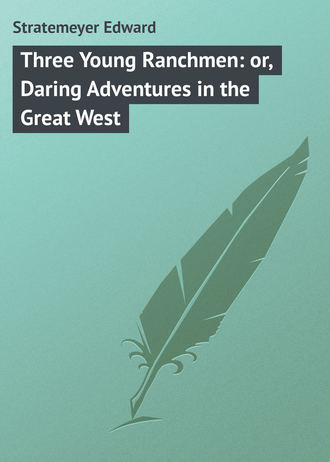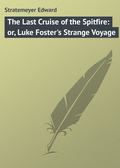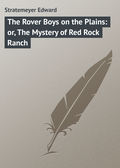
Stratemeyer Edward
Three Young Ranchmen: or, Daring Adventures in the Great West
CHAPTER XIX.
Along the Water Course
"Gone!" burst from Allen's lips.
"What's to do now?" asked Noel Urner.
Ike Watson halted in perplexity for fully a minute. Then he dismounted and waded into the stream, which was scarcely a foot to a foot and a half in depth.
"Ho! ho! ho!" he laughed, suddenly. "I thought so! No, ye can't play thet game hyer.".
"What now, Ike?" questioned the young ranchman.
"They went up in the middle o' this yere stream, thinkin' they could throw me off the trail. See, hyer are the marks ez plain ez the nose on Cap'n Grady's face." And the old hunter pointed into the clear water.
Leaving Allen to bring his horse, Watson walked slowly along the bed of the stream, taking good care not to step into any deep holes. In this manner half a mile was covered, when, at a point where the brush along the bank was thin, the trail led out once more on the dirt and rocks.
"An old trick, but it didn't work this trip," chuckled Ike Watson to himself, as he once more resumed his seat in the saddle.
"What I am thinking of is, what made them suspicious, after they were so far from Casey's Forks," said Allen.
"Perhaps their guilty consciences," laughed Noel.
"Thet, an' because they thought I might be follerin' 'em," added Ike Watson. "Hullo! What does this mean?"
He had followed the trail around a belt of timber. Beyond was a wall of rocks, and here were traces of a recent camp – a smoldering fire and some odds and ends of crackers and meat.
"We ain't far behind 'em, boys!" he went on. "This fire wuz tended ter less than a couple o' hours ago."
"Then let us push on, by all means," returned Allen. "If we can catch those two men before they have a chance to join any of their evil companions, so much the better."
"The trail leads along the rocks," observed Noel. "Have you any idea where we are going?"
"Idee! I know this yere country like a book," said Ike Watson. "Don't ye git 'feered o' bein' lost so long ez ye stay nigh me."
"I don't mean that. I mean, do you know where the men went from here?"
"Up to Grizzly Pass, most likely, an' then along over ter the Black Rock Canyon. Eh, Allen?"
"It would seem so," responded Allen seriously.
"Grizzly Pass; rather a suggestive name," said Noel.
"Ye-as; especially when a big grizzly shows hisself," drawled Watson, and there the conversation dropped.
Despite the fierce sunshine, it was deliciously cool along the base of the rocky wall, and the horses made good progress over the hard but level trail. Here and there immense brier bushes overhung the way, but these were easily avoided by the animals, who were more afraid of them than were their riders.
Presently the trail took an upward course, leading between a split in the rocks.
"Ye want ter be careful hyer," cautioned Ike Watson. "It's a mighty slippery spot fer the best o' hoss flesh."
Scarcely had he spoken when Noel Urner gave a cry of alarm.
He was in the rear, and both the old hunter and Allen turned quickly to see what was the matter.
They found Noel's horse on his knees, having slipped to one side of the trail.
The young man was on the ground, one foot caught in the stirrup.
"Stop the hoss!" cried Watson. "If ye don't he'll bang the young man's head off!"
Before he had ceased speaking Allen was on the ground. He ran back and caught Noel's horse by the bridle. The young man from the east was partly stunned, and it was several seconds before he could recover sufficiently to disengage his foot and arise from his dangerous position.
"Good for you, Allen!" he cried, as he stood by, while the young ranchman assisted the horse to a safe spot in the trail. "I was afraid I was in for it."
"Ye did jes' the right thing, Allen," put in Ike Watson. "Dunno but wot ye hed better walk a brief spell," he went on to Noel, who was only too glad to do so.
Half an hour later the top of the rocks was reached, and they moved back to where the way was smooth and safe. A lunch was had from the pouches, and on they went as fast as the fatigued horses would carry them.
"I can see no trail," said Noel, as he rode abreast of his companions.
"There ain't no need ter see a trail hyer," replied Ike Watson. "This yere way is a blind pocket fer all o' these three miles. Ye couldn't go no different if ye tried. Byme-by, when we come out on Sampson's flats, we'll look for the trail ag'in."
"We ought to catch up to those men before we reach the flats," remarked Allen. "They must be tired out by that climb."
"We ain't fur off," rejoined Watson. "Jes' keep silent half an hour longer, an' we'll – "
He broke off short, reigned in his steed, and pointed ahead.
Allen looked eagerly in the direction. Under the spreading branches of a giant pine rested two men. Not far from them two horses were hoppled. The men looked thoroughly tired. Both were smoking pipes and leaning against the tree with their eyes closed.
"Let us dismount and tiptoe our way to them," whispered Allen. "If we secure their horses first they will have no chance to get away from us."
"A good plan, lad," returned Watson, in an equally low tone. "Supposin' ye an' I leave our nags with Mr. Urner?"
This was agreed upon, and after dismounting the horses were led behind some heavy brush by the young man from the east.
Then, with their weapons ready for use, Allen and old Ike Watson stole cautiously forward to where were grazing the animals belonging to the two bad men from Jordan Creek.
Allen and the old hunter from Gold Fork went about their work as silently as possible. The horses were somewhat in the rear, and so they made a detour, coming up behind the dozing men as softly as twin shadows.
The animals reached, the next thing was to release them. This was speedly accomplished, and it was Allen who led them off, while Ike Watson still remained on guard with his trusty gun ready should the occasion arise to make use of the firearm.
In less than three minutes the young ranchman was back, having left the captured animals in Noel's care.
"Now, what's to do?" he questioned.
"Maybe we hed better git a few ropes ready, in case we want ter bind 'em," began Ike Watson, but ere this idea could be put into execution one of the men dropped his pipe, and the hot tobacco, falling on his hand, brought him upright with a start. He opened his eyes, and with a loud exclamation, which awoke his companion, leaped to his feet.
"What does this mea – " he began.
"Hands up, ye rascal!" ordered Ike Watson, so sternly that instantly both arms were raised high overhead. The horse thief, for the man was nothing less, if not much worse, fully understood that his opponent had the "drop" on him and would not stop to parley unless the order to elevate his hands was obeyed.
The second rascal, in his sitting position, attempted to draw a pistol, but Allen, producing his own weapon, forced the man to remain stationary.
"We hev ye, stranger," remarked Watson after a second of silence. "Do ye acknowledge the corn?"
"What's the meaning of this outrage?" growled the fellow who was standing, and he scowled fiercely, first at the old hunter and then at the young ranchman.
"It means firstly that ye are in our power," chuckled Watson. It was evident that he thoroughly enjoyed the situation.
"Well?"
"Then ye acknowledge thet, do ye?"
"I suppose we'll have to."
"It's Ike Watson from Gold Fork," put in the man who was sitting.
"Ike Watson!" the face of the speaker grew quite disturbed. It was plain he had heard of Watson before and did not relish being held up by the well-known old man.
"Ye-as, I'm Ike Watson," drawled the old hunter. "Now, strangers, give me yer handles, and let me have 'em straight."
"My name is Roe Bluckburn," came from the standing man.
"Mine is Lou Slavin, and I'm not ashamed of it," came from the other.
"Jes' so," mused Watson. "I've heard o' both o' yeez belongin' to the old Sol Davids gang o' hoss thieves."
"You are mistaken. We are not thieves of any sort," said Bluckburn, who appeared the leader of the pair.
"Well, we won't quarrel about that, seein' ez how we are on another trail ter day. We want ye ter up an' tell us ter onct whar Barnaby Winthrop is."
"Yes, and tell us the truth," put in Allen, sternly.
The men were both taken aback by the request. They exchanged glances and each waited for the other to speak.
"Come, out with it, Bluckburn!" cried Watson.
"Dunno the man you are talking about."
"Ye can't come it thet way. Didn't I hear ye talkin' it over down ter Casey's Forks only yesterday? Come, out with the truth, or take the consequences!" and to scare the horse thief Ike Watson tapped his gun barrel suggestively.
"Must be some mistake. We wasn't near Casey's Fork in a month. Eh, Lou?"
"Nixy."
"Ye tell it so smooth I would most believe ye, if I hadn't follered ye up," growled Watson. "But we know ye air in the deal ag'in Barnaby Winthrop, an' I am hyer ter help his nevvy thar, Allen Winthrop. So ye hed better ease yer mind ter onct. Understand?"
The two men turned their attention to Allen curiously. They wished to hold a consultation, but Watson would not permit it.
At that moment Noel Urner came forward, having succeeded in tying all of the horses in a little grove not far distant.
He eyed both of the prisoners keenly, and then gave a start.
"I saw that man in San Francisco!" he ejaculated, pointing to Roe Bluckburn. "He was hanging around the very hotel at which Mr. Barnaby Winthrop stopped."
"It ain't so," growled Bluckburn, but his face proclaimed that Noel Urner had spoken the truth.
"If that is the case, then he is the one who decoyed my uncle away," put in Allen. "For there is no longer any doubt in my mind that he was spirited away in some fashion."
"Air ye fellers goin' ter speak?" roared Ike Watson, impatiently. "Ye can't expect me ter stand hyer with a gun the rest o' the day!"
"Unless you do speak, we shall bind you and hand you over to the sheriff," said Allen. "We believe we have a good case against you – and will have a better after Captain Grady is placed under arrest," he added, struck with a sudden thought.
"Captain Grady!" groaned the man named Lou Slavin. "I reckon the jig is up, Roe."
"Shut up!" growled Bluckburn.
"But if the captain is known wot show have we got?" grumbled Slavin. "Say?" he continued eagerly. "I went into this thing ag'in my will, an' I wish I was out of it. Supposin' I tell yer the truth about the hull gang, does that save me?"
"Don't you say a word, Lou!" shouted Bluckburn, warningly, but ere he could speak further the muzzle of Ike Watson's gun caused him to retreat up to the tree, where he stood, not daring to say another word.
"Go on and have yer say!" cried the old hunter to Lou Slavin. "And, ez I said before, give it ter us straight. Whar is Barnaby Winthrop?"
"He is a prisoner, about ten miles from here," was Slavin's flat and sudden confession.
CHAPTER XX.
Moving against Captain Grady
Both Paul and Chet Winthrop were deeply interested in the words uttered by Jeff Jones, the colored member of the horse thieves' gang.
"So you know something of Captain Grady and our uncle, Barnaby Winthrop?" cried Chet, excitedly. "What do you know?"
"Dat's fer you two fellers ter find out – onless yer let's me go," replied Jeff Jones, suggestively.
"You mean you won't speak unless we grant you your liberty?" put in Paul.
"Dat's de way to figure it."
Paul looked at Chet inquiringly.
"We can't promise anything until Mr. Dottery gets back," said Chet. "But if you know anything about our uncle you had better speak out, if you wish us to do anything at all for you."
"I won't say a word," growled the colored man.
Chet bit his lip in vexation.
"Don't you know what it is to have us able to speak a word for you?" said Paul. "Supposing we let Jack Blowfen take you over to the next camp and tell the men that you are a downright horse thief? Would you fancy that?"
Jeff Jones began to tremble. He knew what Paul meant – that he would be lynched inside the hour. In that section of the country, at that time, horse stealing was considered almost as bad as murder.
"No! no! doan let him take me down ter de Fork!" howled Jeff Jones. "Anyt'ing but dat, boys!"
"Well, you, had better talk, then," returned Paul, severely.
"I doan know much, but I'll tell yo' all I do know," said the prisoner, after a short pause, "and yo' is ter do de best yo' can fo' me, promise me dat?"
"We will," said Chet. He was very impatient for Jeff Jones to proceed.
"Well, den, Captain Grady has been a-spottin' yo' uncle fer seberal weeks – eber sence he got Massah Winthrop ter leave San Francisco."
"Got him to leave San Francisco?" queried Paul.
"Yes. I doan know how de t'ing was done, but he got yo' uncle ter leave de city an' now he's tryin' ter make him gib up de secret ob a mine, or sumfin like dat."
"Gracious!" burst from Chet's lips. "That explains it all. Uncle Barnaby must be in Captain Grady's power."
"And by getting us out of the ranch he thought to make us leave the neighborhood," added Paul. "Do you know," he went on, "I believe he is at the head of a band who wish to obtain entire control of this section."
"I don't doubt it, Paul," Chet turned to the prisoner. "Where is our uncle now?"
"Dat I can't say."
"Captain Grady must know."
"Suah he does."
"Then we'll make him tell, never fear," Chet began to walk up and down. "I wish Mr. Dottery would come back."
"I hear somebody down the road," said Paul as he walked to the door. "It must be the two coming back now."
Paul was right. There was a clatter beyond in the dark, and a moment later Caleb Dottery appeared, followed by Jack Blowfen.
"Couldn't catch 'em in the dark," said Dottery, as he strode into the house and dropped into a rude but comfortable chair. "But thank fortune, the stock is safe!"
"Slick rascals, Mangle and Nodley," continued Jack Blowfen. "But we'll round 'em up some day, I'll bet my sombrero on it."
"We have just heard important news," said Paul, and he instantly proceeded to repeat what Jeff Jones had said.
Caleb Dottery and his cowboy helper listened with interest. The former gave a long, low whistle of astonishment.
"Must say I didn't quite think it of Captain Grady, though I allow as how he's a slick one," he remarked. "Wot's ter do about it?"
"We came here to obtain your aid," said Chet. "Captain Grady has taken possession of our ranch. You know he sets up some sort of a claim to it."
"Got yer papers, ain't ye?"
"No; they were burned up when we had our little fire."
"Humph! thet's bad!"
"But the place is ours – father bought and paid for it," added Paul, warmly. "And we intend to get Captain Grady out, even if we have to fight him."
"Good fer ye!" shouted Jack Blowfen. "Thet's the way ter talk. I'm right hyer ter help ye. I love grit, I do!" and he held out his big brown hand to Paul as if to bind a bargain.
"I'll certainly help ye, too," said Dottery. "Ye have done a good turn this night which I'm not likely to forgit in a hurry."
"This colored man told us about our uncle and Captain Grady of his own free will," said Paul. "So, if you can be a little easy on him on that account I wish you would be."
"Stealin' hosses ain't no light crime," growled Dottery.
"An' it don't improve a man's reputation to become a sneak," added Jack Blowfen.
Yet, after some talk, it was agreed to hold Jeff Jones merely as a prisoner for the present, instead of carrying him to the nearest camp to be turned over to the vigilance committee.
It was now so near morning that to think of retiring was out of the question. The men began to smoke, and Blowfen stirred about getting breakfast. At six o'clock they dined.
"I'll chain Jones up as a prisoner in the house till we git back," observed Dottery, when the meal was finished. "He'll keep quiet if he knows when he is well off."
This was done, and then both house and outbuildings were made as secure as possible.
Ten minutes later Paul, Chet, and the two men were on their way on horseback to the Winthrop ranch. All were armed and ready for anything that might turn up.
But not one of the number dreamed of the several surprises in store for them.
CHAPTER XXI.
Shooting a Grizzly Bear
"I wonder if Captain Grady is alone or if he has a number of the gang with him?" observed Paul, as he rode alongside of his younger brother, and just in front of the two men.
"Most likely he is expecting trouble and has help at hand," returned Chet. "He knows well enough we won't give up our claim without a fight."
"It's possible he thought to frighten us off until Allen got back from San Francisco."
"Don't make any difference how much help he has," broke in Jack Blowfen. "He ain't no right to put ye out like a couple o' dogs, an' he knows it."
In this manner the talk went on until a little after noon, when the locality known as Demon Hollow was reached.
"Do you remember the badger, Paul?" laughed Chet. "The Hollow looks different in the daylight, doesn't it?"
"Yes, indeed, but still – what was that?"
"Jumpin' June bugs!" cried Jack Blowfen. "Dottery, did ye hear that?"
"I did," replied the old ranch owner, and he clutched his gun apprehensively.
"I heard something," said Chet. "What was it?"
"A bar, boy, sure ez ye are born – a grizzly!"
"Oh!"
At once the little party came to a halt. To the right of them was a tall overhanging rock, to the left a number of prickly bushes. Ahead and behind was the winding and uneven road along which their animals had come on a walk.
"Do ye see old Ephraim?" asked Jack Blowfen, as he, too, got his gun in readiness.
"I don't see anything," declared Paul.
Bang! It was Chet's gun which spoke. He fired up toward the top of the overhanging rock. Scarcely had the shot rung out than a fearful roar of mingled pain and rage rent the air.
"Shot him, by Jupiter!" cried Caleb Dottery. "Stand from under, quick!"
Hardly had the word been given than there was another roar. Then a heavy weight filled the air and down into the road leaped a big brown and gray grizzly weighing all of eight hundred pounds.
He came down between the boys and the two men, and no sooner had he landed than Dottery and Blowfen opened fire on him, both striking the beast in the shoulder, and, consequently, doing but little damage, for a grizzly bear is tough and can stand many shots which do not touch his vital parts.
The horses, much scared, backed in all directions, some going into the bushes and others up against the rocks.
More angry than before the grizzly half turned, and then, without warning, raised up on his hind legs and made for Chet, whose horse was now flat upon the rocks, having stumbled in his hasty retreat, Chet himself was partly in and partly out of the saddle when the charge was made.
"Run, Chet, run!" yelled Paul. "He is coming for you!"
In alarm he came up on foot, his horse refusing to budge in the direction of the bear.
The bear heard Paul's voice and for the second paused and turned, as if to make sure he was in no immediate danger from that quarter. Then he continued to advance upon Chet.
Almost overcome with fear, Paul raised his gun and fired at the bear's head. It was a chance shot, but luckily it hit the huge beast in the ear. The bear howled with pain, staggered forward a few feet and rolled over on his side.
By this time Dottery and Blowfen had their pistols out. Leaping to the roadway, they ran forward, and in less than a minute the bear had received six pistol balls and was kicking in his death agony.
It was Paul who helped Chet to his feet. The boy was as white as a sheet and trembled so he could scarcely stand.
"I – I thought I was a goner!" he stammered. "What a big fellow he is!"
"The bar we war arfter last spring," said Jack Blowfen to Dottery as they examined the brute. "See those marks on his side where we tipped him? A good job that he is out of the way."
It was the second grizzly bear the boys had seen since they had lived in that section and they gazed at him curiously. What white teeth he had, and how powerful he looked! Even now that he was still and all was over, Chet hardly cared to touch him.
"I want to see no more of him," he said.
"Well, I reckon he's the last in this neighborhood," said Caleb Dottery. "He's the only one I've seen around in nigh on six years."
It was decided to leave the bear where he was until they returned. Of course, it was possible some wild animal might come up and make a feast in the meanwhile, but this could not be helped. To skin the animal and hang up the meat would take too long.
Leaving Demon Hollow, they pushed along as rapidly as the horses would carry them.
At the creek they stopped to water the animals, and here also partook of the lunch which Blowfen had packed up before starting.
It was nightfall when they at last came in sight of the ranch home. All seemed deserted. Every building was tightly closed and so was the gate to the stockade.
"Maybe he has thought better of it and skipped out," said Chet.
"There is our stuff still in the road," returned Paul, pointing ahead.
In a moment more they had reached the stockade. All four rode straight up to the heavy wooden gate.
"I'll have to jump over and unbar it," said Paul.
"Be careful," was Caleb Dottery's caution. "This may be a trap and – "
He had no need to say more.
"Halt!" came from the yard behind the stockade. "Stop where you are or I'll fire on you!"
It was Captain Grady himself who spoke.







